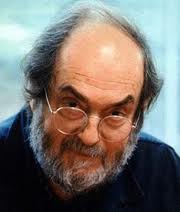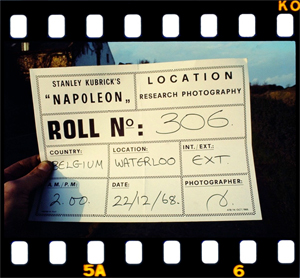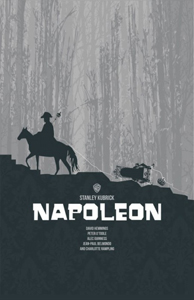
There’s a long history in Hollywood of shelved projects, abandoned franchise dreams, stalled careers, and entire genres that lost favor or profitability. 9 times out 10 these problems and failures are the result of a myriad of complex issues and contributing factors. Sometimes though… Sometimes you can pretty much pin everything on one film that fucked it up for everyone. Whether it’s a movie that killed a rival project, destroyed a filmmaker’s career, squashed some brilliant idea, or took the shine off of an entire genre, this CHUD List will catalog the films that were just total, unapologetic Cockblocks.
———-
———
Day 7 (Kubrick’s Napoleon – Cockblocked!)
Jeremy G. Butler (Email • Facebook)
———-
 THE COCK: Stanley Kubrick’s Napoleon. Fresh off of 2001: A Space Odyssey, Kubrick was riding high on a wave of artistic, critical and financial success. As such, MGM gave him carte blanche for his next picture, which he decided to devote to the life of Napoleon Bonaparte. Not just a portion thereof, a specific battle or even the whole of the Napoleonic War – Kubrick was going to tackle the man’s entire life. It was to be an epic that spanned fifty years and took the viewer on a sweeping, three-hour journey across the globe, with location shoots to have taken place in the UK, France and Romania and “front projection” to fill in the gaps for places like Versailles, where Kubrick‘s crew wouldn’t have been allowed to film. Painstakingly researched, meticulously planned and with a budget of what would have been about $100 million in today’s dollars, it would have been the most expensive film of its time.
THE COCK: Stanley Kubrick’s Napoleon. Fresh off of 2001: A Space Odyssey, Kubrick was riding high on a wave of artistic, critical and financial success. As such, MGM gave him carte blanche for his next picture, which he decided to devote to the life of Napoleon Bonaparte. Not just a portion thereof, a specific battle or even the whole of the Napoleonic War – Kubrick was going to tackle the man’s entire life. It was to be an epic that spanned fifty years and took the viewer on a sweeping, three-hour journey across the globe, with location shoots to have taken place in the UK, France and Romania and “front projection” to fill in the gaps for places like Versailles, where Kubrick‘s crew wouldn’t have been allowed to film. Painstakingly researched, meticulously planned and with a budget of what would have been about $100 million in today’s dollars, it would have been the most expensive film of its time.
THE BLOCK: The easiest and most oft-given answer is Sergei Bondarchuk’s Waterloo – a sweeping war epic in the style of War and Peace that dealt with the titular battle (starring Rod Steiger as the diminutive Frenchman) which was a critical and commercial failure – boasting a budget comparable to Napoleon’s and recouping about one-fifth of that at the box office. But it might not be quite that simple.

Everything was going swimmingly; and while sources vary on who was actually cast, names like Jack Nicholson, David Hemmings, Audrey Hepburn, Jean-Paul Belmondo, Alec Guinness and Peter O’Toole were being bandied about and most reports have Kubrick championing the future Jack Torrance for the title role. In just months, pre-production costs had neared half a million dollars (just in research!) and cameras were slated to roll in 1970. However, while Birkin was in Vienna, he got the call from Kubrick.
MGM had backed out and in 1969 the project was officially declared dead.
 And this is where laying the blame on Waterloo gets fuzzy, as Bondarchuk’s movie didn’t street until 1970. So what was it? Well, part of it was MGM’s being bought out by Kirk Kerkorian, a Las Vegas mega-developer whose interest in MGM didn’t extend beyond its value as a brand (Kerkorian would later go onto open the MGM Grand Hotel & Casino in Las Vegas) and its extensive library of films. And after the studio had posted losses of around $35million for 1969 alone, Kerkorian decided that he had no interest in continuing to fund its sinking production/distribution operation. Instead, he placed former CBS President James T. Aubrey in charge of the studio and instructed him to cut costs and decrease output. And if you’re cutting costs, a film that’s racked up half a million dollars in research alone doesn’t lend itself well to being kept alive.
And this is where laying the blame on Waterloo gets fuzzy, as Bondarchuk’s movie didn’t street until 1970. So what was it? Well, part of it was MGM’s being bought out by Kirk Kerkorian, a Las Vegas mega-developer whose interest in MGM didn’t extend beyond its value as a brand (Kerkorian would later go onto open the MGM Grand Hotel & Casino in Las Vegas) and its extensive library of films. And after the studio had posted losses of around $35million for 1969 alone, Kerkorian decided that he had no interest in continuing to fund its sinking production/distribution operation. Instead, he placed former CBS President James T. Aubrey in charge of the studio and instructed him to cut costs and decrease output. And if you’re cutting costs, a film that’s racked up half a million dollars in research alone doesn’t lend itself well to being kept alive.
But Kubrick didn’t stop with MGM – he took Napoleon to United Artists (to whom Aubrey had sold the entirety of MGM’s distribution rights in 1973). But, by now, Bondarchuk’s film had been released and its failure was well-known and UA had absolutely no interest in bankrolling another potential failure. And with that, finding no appetite for the film that had taken up so much of his life and consumed his entire existence for so long (there are reports that Kubrick had started to do things like eat his steak and ice cream at the same time because that’s the way Napoleon used to eat), Kubrick was forced to file the entirety of what would have been Napoleon away.
And then he made A Clockwork Orange.
Verdict: Bullet Dodged. A beautifully crafted, magnificent, amazing bullet; but a bullet nonetheless.
 The Alternate Universe: Kerkorian never buys MGM and the company pins its last hopes (read: last dime) on Kubrick’s name and legacy to deliver the studio from collapse. It doesn’t and the studio falls. Kubrick, now with the death of a major studio on his hands is blacklisted from the industry and MGM becomes nothing more than a footnote in cinema’s epic history. Its library and distribution rights are picked over and sold off in a crass auction that carries with it the black cloud of an estate sale. Napoleon goes on to be featured in lists and documentaries the world over as The Film that Killed Hollywood. We mention the release of the Criterion Blu-ray on an upcoming Special Edition article.
The Alternate Universe: Kerkorian never buys MGM and the company pins its last hopes (read: last dime) on Kubrick’s name and legacy to deliver the studio from collapse. It doesn’t and the studio falls. Kubrick, now with the death of a major studio on his hands is blacklisted from the industry and MGM becomes nothing more than a footnote in cinema’s epic history. Its library and distribution rights are picked over and sold off in a crass auction that carries with it the black cloud of an estate sale. Napoleon goes on to be featured in lists and documentaries the world over as The Film that Killed Hollywood. We mention the release of the Criterion Blu-ray on an upcoming Special Edition article.
Honestly, it probably wouldn’t have been that bad, but we’d certainly be talking about Kubrick in the same breaths as Bondarchuk and Michael Cimino (actually, his Heaven’s Gate debacle and what it did to United Artists is pretty close to what was described above and that film had a similar set of circumstances, so who knows – maybe it’s not that far off after all).
Remains: All of it. Everything. Every single bit of pre-production work that Kubrick and his team put together still exists. Over 20,000 photos, a 28,000-word treatment, thousands of documents and transcripts of conversations that Kubrick had with the various scholars and academics. 88 boxes worth of material, and it’s all filed away in an outbuilding on Kubrick’s Childwickbury Estate in Hertfordshire.

However, that’s not they only place they exist. In 2009, book publisher Taschen released Napoleon: The Greatest Film Never Made, a collation of every single bit of Kubrick’s work on the film. Featuring “a selection of Kubrick’s correspondence, various costume studies, location scouting photographs, research material, script drafts, and more,” the work consists of ten hardback books (one for each category of pre-production material covered) housed in a larger, hollowed-out fake hardback book. Because it’s full of the actual work, it’s the definitive source for information on the film, but a look at all of that material will cost you – the book is limited to 1,000 editions and runs $1,500 a pop. I don’t think there’s any question of worth – that would be a keystone addition to any film fan’s collection – and even though it’s sold out you can go here to take a gander at it. Who knows, maybe it’ll turn up on eBay one day.
